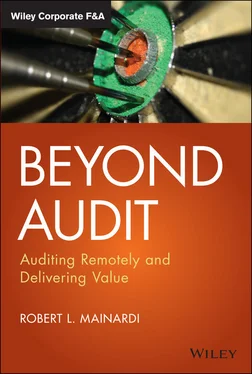As discussed previously, relationship building is a critical part of any audit and business partner relationship. Auditors leverage this relationship to assist in the facilitation of all phases of an audit, from planning to action plan implementation. We are going to discuss both the relationship values in every phase of the audit and the need for audit to remain focused on relationship building.
With the unplanned emergence of remote auditing due to the pandemic, business partner relationships have become even more important to the success of every audit. These relationships fuel and drive the learning and sharing of critical business process information and required data sharing. As we go through the discussion of each audit phase, consider how focused your audit team is currently on relationship building. Does your team dedicate the time and resources it takes to foster and strengthen the audit and business partner relationship? Is there an interaction with business personnel? Or is the audit team too focused on getting the fieldwork completed and the final report issued so they can move on to the next project? I totally understand. Finishing outstanding audits helps the audit department move the coverage needle and get closer to completing the communicated audit plan. However, being in audit is not solely about completing the audit plan. Also, just because the team finishes the audit plan, does not translate into the audit department adding value to the company and being seen as a true asset to business operations. The audit department should be building on their existing audit knowledge, obtaining a more detailed understanding of the business objectives and corresponding processes, and providing value-added recommendations to their business counterparts linked directly to the achievement of the confirmed business objectives in the most effective and efficient manner. Unfortunately, those critical skills and business knowledge can only be developed from conversations and exposure with the business partners. The business personnel have the detailed information that can assist in auditor development. The knowledge auditors can develop and build on will make them a more valuable partner and asset to the business partners as audits continue to expand in scope and criticality. So, let's first examine each phase of the audit and discuss the role the auditor and business partner relationship plays in the successful completion of planning, fieldwork, and reporting.
To successfully complete any phase of an audit or any project, you must have specific and clear understanding of the objective. Remember, when talking about an objective (as a noun, not an adjective), it means purpose . Once you have identified the purpose, you can direct all efforts to building a stronger understanding, work plan, and valued feedback to your business partner to assist them in achieving their goals. Without this knowledge, how would you know what topics to understand, red flags to looks for, data to test, and recommendations to develop?
So, let's first start with the audit plan. You have been given an audit and begin to compile critical business process–level information related to a particular business unit, which you may or may not have encountered before. Additionally, it may be the first time the audit department has audited this particular area, so there are no previous audit reports or documentation to provide any background on your new assignment.
How do auditors approach such a task when they are beginning at ground zero when it comes to information on this unknown business function? Most auditors will do the obvious and go straight to the internet and research this particular topic to see what most common information about this process is available. They may go to their favorite audit-related internet site to try and obtain more information or possibly “canned” audit programs related to their assignment.
Keep in mind that after your online research efforts are complete, the information you have obtained is only a general overview and does not in any way, shape, or form represent the business processes within your company. Every company and its corresponding business support processes have specific requirements that are unique to their way of doing business. And those unique business characteristics can only be learned from the business personnel and not the internet. Thus, there is a mandatory need to establish a good working relationship with the business partner to gain a baseline understanding of the function. If this truly is a business function the audit department has never reviewed, it is going to be critical for the lead auditor to ensure they explain to their business contact the audit department objectives and how an audit works. Again, while this may seem like an easy task, the audit leadership team must ensure all auditors have the same knowledge of the audit function and deliver a consistent message to audit clients regarding audit's mission and the required steps necessary to complete an audit. This will guarantee that all audit clients are receiving the same message regarding the audit process and the need for business partner involvement throughout the audit to ensure its success.
While auditors need to acquire business process knowledge during the planning phase, they must recognize completing the task does not mean acquiring the same knowledge as the business processing personnel. Too many times, auditors in the planning phase exhaust the full planning budget diving too deep into the intimate details of a business process. Getting “buried in the weeds,” for a lack of a better phrase, usually means the audit team has gone too far into the business process minutia, which, in the end, will not increase the value of audit testing or the final report. During the planning phase, it is important to remain focused on the key business processes, which drive the achievement of the business deliverables (objectives). This is accomplished by reviewing the business developed policies and procedures, available flowcharts, and process walkthroughs with business personnel. The auditor should use every meeting and interaction with business team members to strengthen and foster the audit and business partner relationship. Auditors should spend more time with their business partners explaining the learning approach an audit requires and the corresponding reasons why it is so important. Let your business partners know how important the information sharing (and learning) is to an auditor during the planning phase as it sets the direction and focus of the upcoming audit. Additionally, all knowledge gained will be used in the development of the audit testing. With the proper business knowledge sharing, the audit planning documentation can be executed with minimal issues, questions, and business personnel disruption. Sufficiently detailed planning documentation will provide a solid foundation for the audit testing to be developed and executed, again, with minimal disruption to the client. This type of approach seems pretty standard. Meet with the client; gain an understanding; share information regarding the audit process; and learn as much as you can during planning. Appears to be pretty straightforward and simple. No – imagine trying to accomplish all of these things over the phone or video call without being able to sit down in the same room with the person and facilitate these critical discussions. I do not care how good a communicator you may be. Executing these discussions remotely poses significant barriers to success, not to mention an increased time commitment. If an initial planning meeting with a client to explain the audit process, introduce the team, and discuss the initial scope usually takes about an hour, consider doubling that budget at a minimum if you are doing it remotely. And I am going to assume, if this is a new client who has never been audited, the budget will be more than double. I am not suggesting the time commitment is not worth it. On the contrary, I believe it is not just worth it – it is mandatory. Do not skimp or rush through the audit department overview (or any other parts) during the introduction meeting with your client, because this meeting not only sets the tone for the current audit but is also the foundation for the audit and business partner relationship.
Читать дальше











